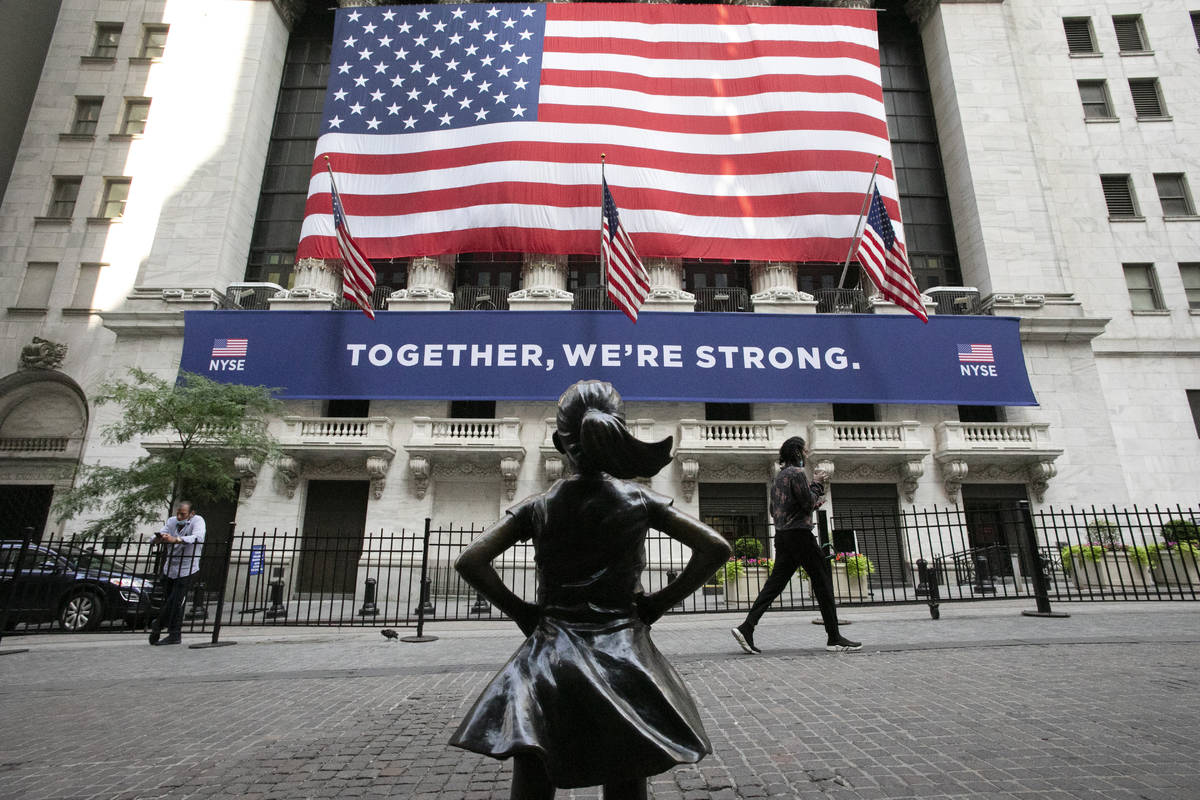Markets end year at record highs

Wall Street closed out a tumultuous year for stocks with more record highs Thursday, a fitting coda to the market’s stunning comeback from its historic plunge in the early weeks of the coronavirus pandemic. The rally has benefited a number of Nevada-based casino companies and executives.
The benchmark S&P 500 index finished with a gain of 16.3 percent for the year, or a total return of about 18 percent, including dividends. The Nasdaq composite, powered by high-flying Big Tech stocks, soared 43.6 percent. The Dow Jones Industrial Average gained 7.2 percent, with Apple and Microsoft leading the way.
The market’s milestone-setting finish follows a mostly upward grind for stocks in recent weeks, fueled by cautious optimism that the U.S. economy and corporate profits will bounce back in 2021 now that the distribution of COVID-19 vaccines is under way.
“We came into the year expecting slow growth and it turned out to be the fastest bear market recovery in history,” said Sunitha Thomas, national portfolio advisor at Northern Trust Wealth Management.
Casinos recover lost ground
The virus pandemic shocked markets early in the year. The S&P 500 fell 8.4 percent in February, then plunged 12.5 percent in March as the pandemic essentially froze the global economy. Businesses shut down in the face of the virus threat and tighter government restrictions. People shifted to working, shopping and doing pretty much everything else from home.
The dire economic situation weighed heavily on almost any company that relied on direct consumer spending or a physical presence, including restaurants, mall-based retailers, along with airlines and hotels — the bedrock of Las Vegas’ tourism-based economy.
Nevada’s’ six largest public casino companies’ shares have been able to recover most, if not all, of the ground lost earlier this year.
Caesars Entertainment Inc. shares went from $59.64 to $74.27 between January and December, a 24.5 percent uptick. MGM Resorts International dropped 5.3 percent throughout the year to $31.51; Wynn Resorts Ltd. dropped 18.8 percent to $112.83; Las Vegas Sands Corp. dropped 13.7 percent to $59.60; Boyd Gaming Corp. rose 43.4 percent to $42.92; and Red Rock Resorts Inc. rose 4.6 percent to $25.04.
The low point for the companies’ shares this year was in March, after Nevada casinos were ordered to shut down for months. The subsequent market rally has personally benefited at least two Las Vegas casino company CEOs: Matt Maddox of Wynn and Bill Hornbuckle of MGM.
The two CEOs traded in their base salaries for company stock when prices were low in late March. Stock prices have gone up 96 and 173 percent for Wynn and MGM, respectively, between the agreement dates and when the CEOs’ shares vested Thursday.
On March 23, Maddox traded in the remainder of his $2 million base salary for common stock in Wynn. While originally worth $1.8 million, the 32,071 shares he was awarded are now worth more than $3.6 million, based on Thursday’s closing price on the Nasdaq.
That same month, Hornbuckle agreed to trade the remainder of his $1.1 million annual salary for $700,000 worth of restricted stock units. Those units are now worth $1.9 million, based on the New York Stock Exchange’s closing prices.
Spokespeople for both companies previously said the CEOs traded in their base salaries to help the companies conserve cash. A Wynn spokesman also noted that Maddox asked Wynn’s board of directors to allow him to reallocate 140,000 shares previously granted to him to the Wynn Las Vegas and Encore Boston Harbor management teams that worked on the resorts’ COVID-prevention plan.
A quick comeback
Trading became volatile, especially in the early weeks of the pandemic, as investors scrambled amid an increasingly grim economic outlook. The Dow had several day-to-day swings of about 2,000 points. And the S&P 500 rose or fell by at least 1 percent on twice as many days in 2020 than it did, on average, since 1950.
The VIX, which measures how much volatility investors expect from the S&P 500, climbed to a record high 82.69 in March and remained above its historical average for much of the year.
The wave of selling accelerated as the economic fallout from the pandemic widened, leaving many long-term investors looking on as their gains after a blockbuster 2019 for stocks evaporated. Five months later, the market recouped all of its losses.
“It was probably very hard to imagine getting those back in such a short period of time,” said Shawn Cruz, senior market strategist at TD Ameritrade.
Wall Street didn’t stay down for long, thanks in large part to unprecedented actions from the Federal Reserve and Congress to support the economy.
The Review-Journal is owned by the family of Las Vegas Sands Corp. Chairman and CEO Sheldon Adelson.
Contact Bailey Schulz at bschulz@reviewjournal.com. Follow @bailey_schulz on Twitter. The Associated Press contributed to this report.